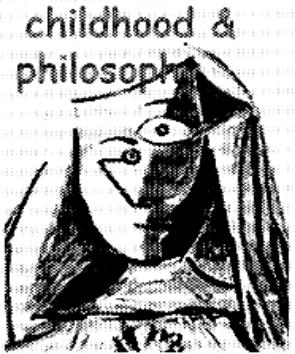reconsidering school in painful times
an ending-beginning conversation
DOI:
https://doi.org/10.12957/childphilo.2025.90574Keywords:
school, beginning, ; childhood, racism, Jane ElliotAbstract
This article consists of an epistolary conversation between two experienced scholars in the field of philosophy of childhood around different dimensions of schooling. Starting from a shared diagnosis of the actual state of the world where greed, mendacity, corruption, cynicism, and cruelty and violence in politics and public speech prevail, a common search for a (new) beginning of another world—a novum--is carried out. The concept of childhood plays a core role in this conversation, one inspired by the utopian thinking of various prophetic intellectuals: Deleuze and Guattari and “becoming child”; Spinoza’s “joy”; Marcuse’s “new sensibility”; the Romantic “renovation of perception” or William Blake’s “cleansing” of the “doors of perception”; Paulo Freire’s relationship to the concept of “beginning,” and Nego Bispo’s circle of “beginning-middle-beginning.” The content and form of a general letter of intent to those adults participating in the formation of a hypothetical utopian school is discussed, imagining the relationship of such a school to lived space and time, body, animals, plants love, friendship, equality, hope, errantry, joy, questioning, listening, creating and dreaming. In that same context Jane Elliot’s well-known blue-eyes/brown eyes anti-racist experiment in the sixties is presented in order to problematize the power of school as an adult-child intentional community that might self-organize to function as a potential ground of personal and social transformation, both for students and teachers. The conversation ends, paradoxically, with the affirmation of beginning as a childlike force in schooling.
Downloads
References
Althusser, L. (2008). On Ideology. Verso.
Arendt, H. (1958). The Human Condition. University of Chicago Press.
Buhner, S. H. (2014). Plant Intelligence and the Imaginal Realm: Beyond the Doors of Perception into the Dreaming of Earth. Bear & Company.
Blake, William. The Marriage of Heaven and Hell. In Complete Writings, 148-58. Oxford: Oxford University Press. 1966.
Buber, M. (1965). The Knowledge of Man: A Philosophy of the Interhuman (Trans. R.G. Smith). Harpeer.
Couto, M. (2009). E se Obama fosse africano? Companhia das Letras.
Deleuze, G., & Guattari, F. (1987). A Thousand Plateaus: Capitalism and Schizophrenia. University of Minessota Press.
Freire, P. (2005). Pedagogy of the Oppressed (Trans. Myra B. Ramos). Continuum.
Grosz, E. (2005). Bergson, Deleuze and the Becoming of Unbecoming. Parallax, 11(2), 4–13.
Horton, M., & Freire, P. (1990). We make the road by walking. Temple University Press, 1990.
Kohan, W. O. (2015). The inventive schoolmaster. Sense.
Kohan, W. O. (2022). Uma viagem de sonhos impossíveis. Autêntica.
Marcuse, H. (1969). An Essay on Liberation. Beacon Press.
Nietzsche, F. (1999). Thus Spake Zarathrustra (Trans. T. Commons). Dover.
Peirce, C. S. (1966). Selected Writings (Values in a Universe of Chance). Dover.
Santos, A. B. (2022). Início, meio, início. In A. B. Santos et al. (Eds.), Quatro Cantos (Vol 1). N-1 Edições.
Santos, A. B. (2023). Somos da terra. In F. Carnevalli, F. Regaldo, P. Lobato, R. Marquez, & W. Cançado (Eds.), Terra: antologia afro-indígena. Ubu Editora; PISEAGRAMA.
Santos, A. B., Kohan, W. O., & Pereira, G. (2025). “Eu lhe ensinei tudo que eu sabia, mas eu não sabia tudo que eu queria lhe ensinar”. Trans/Form/Ação, 48. https://doi.org/10.1590/0101-3173.2025.v48.n1.e025053
Traherne Thomas. (1960). Centuries. Harper.
Wall, J. (2021). Give Children the Vote: On Democratizing Democracy. Bloomsbury Academic.
Wordsworth, W. (1807). Ode. Intimations of Immortality from Recollections of Early Childhood. In Poems in Two Volumes. Longman, Hurst, Rees, and Orms.



